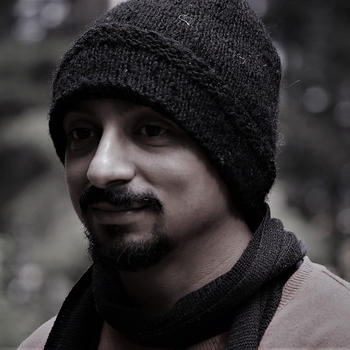Prabhash Ranjan Tripathy

Interweaving Performance Cultures
Doctoral Candidate 2017/18
Born in Odisha, India. Received his B.A English (Hons), M.A. in English Literature and M.A. in Comparative Indian Literature from the University of Delhi. Currently a PhD scholar at the School of Arts and Aesthetics, Jawaharlal Nehru University. Has recently submitted his MPhil dissertation titled ‘Playing Cyborg: A Study of the Gamer in the Video Game Parlours of Delhi and Mussoorie’ and would like to explore the topic further in his PhD. Areas of interest include superhero comic books, anime, video games, combat sports and mythology. Is fascinated by felines and loves to trek, read, write, click and play.
Research Project
Playing Cyborg: A Study of Video Game Parlours in Delhi and Mussoorie
Who or what plays a game?
What does it mean to play a game?
What does ‘play’ mean to any being?
My research can be read as an engagement with discourses surrounding play, games, technology and the various figures, such as animal, child, human, cyborg etc., deployed to construct the narratives for these discourses. Through this engagement the research aims to understand the gamer who emerged in the 1990s as coin-operated arcade video games were introduced to the Indian market. ‘Fighting games’ dominated this scenario; small shops in slums or alleys would have 6-7 cabinets (assembled locally) placed next to one another. The rooms would be dingy, dark and full of boys of the age group 12-20. Specific tastes, practices and rituals or local aspects of gameplay developed around these video game parlours, while in their structure and medium the games themselves remained universal. My work tries to understand gameplay within this idea of completion, i.e. between universal and local aspects.
Posthuman theory provides a functional framework to develop such an understanding. The gamer can be articulated as a cyborg: an ontology emerging from the fusion of the technological and the biological—yet not a universal figure. The cyborg/gamer exists in its plurality. The posthuman theory also provides an opportunity to study the cyborg and its gameplay alongside the gameplay of human, animal and child. The aim of the project is to answer the larger questions posed at the beginning, to understand how the cyborg plays and what it means to play cyborg by playing with the posthuman figure of the cyborg.
Recommended Readings
- Eugen Fink. Play as Symbol of the World and Other Writings. Indiana: Indiana University Press, 2016.
- Suits, Bernard. The Grasshopper: Games, Life and Utopia. Broadview Press, 1978.
- Aldis, Owen. Play Fighting. Elsevier, 2013.
- GOTO-JONES, Chris. “Is ‘Street Fighter’ a Martial Art? Virtual Ninja Theory, Ideology, and the Intentional Self-Transformation of Fighting-Gamers.” Japan Review 29 (2016): 171–208.
- Waiming Ng, Benjamin. “Street Fighter and The King of Fighters in Hong Kong: A Study of Cultural Consumption and Localization of Japanese Games in an Asian Context.” The International Journal of Computer Game Research 6.1 (2006): 1–15.


